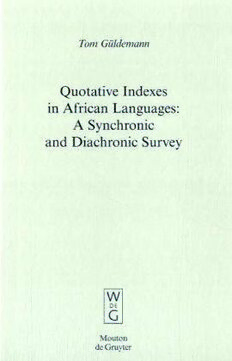Download Quotative Indexes in African Languages: A Synchronic and Diachronic Survey PDF Free - Full Version
Download Quotative Indexes in African Languages: A Synchronic and Diachronic Survey by Tom Güldemann in PDF format completely FREE. No registration required, no payment needed. Get instant access to this valuable resource on PDFdrive.to!
About Quotative Indexes in African Languages: A Synchronic and Diachronic Survey
The book represents the results of a synchronic and diachronic cross-African survey of quotative indexes. These are linguistic expressions that signal in the ongoing discourse the presence of a quote (often called ""direct reported speech""). For this purpose, 39 African languages were selected to represent the genealogical and geographical diversity of the continent. The study is based primarily on this language sample, in particular on the analysis of quotative indexes and related expressions from a text corpus of each sample language, but also includes a wide range of data from the published literature on other African as well as non- African languages. It is the first typological investigation of direct reported discourse of this magnitude in a large group of languages. The book may thus serve as a starting point of similar studies in other geographical areas or even with a global scope, as well as stimulate more detailed investigations of particular languages. The results of the African survey challenge several prevailing cross-linguistic generalizations regarding quotative indexes and reported discourse constructions as a whole, of which two are of particular interest. In the syntactic domain, where reported discourse has mostly been dealt with under so- called sentential complementation, the study supports the minority view that direct reported discourse and also a large portion of indirect reported discourse show hardly any evidence for the claim that the reported clause is a syntactic object complement of some matrix verb. With respect to grammaticalization, the work concludes that speech verbs are, against common belief, not a frequent source of quotatives, complementizers, and other related markers. Far more frequent sources are markers of similarity and manner; generic verbs of equation, inchoativity, and action; and pronominals referring to the quote or th
Detailed Information
| Author: | Tom Güldemann |
|---|---|
| Publication Year: | 2008 |
| ISBN: | 9783110185904 |
| Pages: | 708 |
| Language: | |
| File Size: | 5.494 |
| Format: | |
| Price: | FREE |
Safe & Secure Download - No registration required
Why Choose PDFdrive for Your Free Quotative Indexes in African Languages: A Synchronic and Diachronic Survey Download?
- 100% Free: No hidden fees or subscriptions required for one book every day.
- No Registration: Immediate access is available without creating accounts for one book every day.
- Safe and Secure: Clean downloads without malware or viruses
- Multiple Formats: PDF, MOBI, Mpub,... optimized for all devices
- Educational Resource: Supporting knowledge sharing and learning
Frequently Asked Questions
Is it really free to download Quotative Indexes in African Languages: A Synchronic and Diachronic Survey PDF?
Yes, on https://PDFdrive.to you can download Quotative Indexes in African Languages: A Synchronic and Diachronic Survey by Tom Güldemann completely free. We don't require any payment, subscription, or registration to access this PDF file. For 3 books every day.
How can I read Quotative Indexes in African Languages: A Synchronic and Diachronic Survey on my mobile device?
After downloading Quotative Indexes in African Languages: A Synchronic and Diachronic Survey PDF, you can open it with any PDF reader app on your phone or tablet. We recommend using Adobe Acrobat Reader, Apple Books, or Google Play Books for the best reading experience.
Is this the full version of Quotative Indexes in African Languages: A Synchronic and Diachronic Survey?
Yes, this is the complete PDF version of Quotative Indexes in African Languages: A Synchronic and Diachronic Survey by Tom Güldemann. You will be able to read the entire content as in the printed version without missing any pages.
Is it legal to download Quotative Indexes in African Languages: A Synchronic and Diachronic Survey PDF for free?
https://PDFdrive.to provides links to free educational resources available online. We do not store any files on our servers. Please be aware of copyright laws in your country before downloading.
The materials shared are intended for research, educational, and personal use in accordance with fair use principles.

